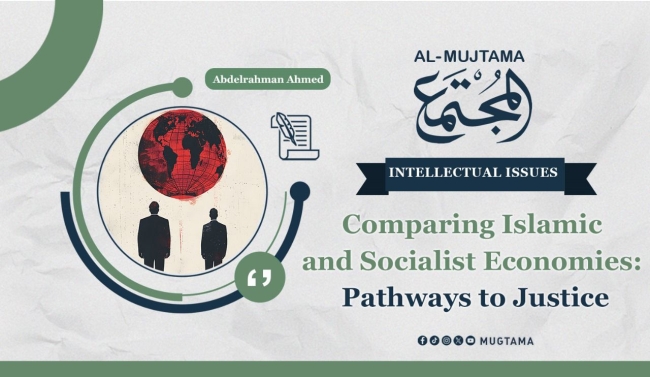Comparing Islamic and Socialist Economies: Pathways to Justice
Economic systems shape societies by dictating how resources are distributed, how wealth is generated, and how social justice is achieved. Among various economic frameworks, Islamic and socialist economies offer distinct approaches to addressing inequality and promoting justice. While both systems aim to create fair and equitable societies, they differ significantly in their principles, mechanisms, and outcomes. This essay explores these differences and evaluates which system might better achieve justice.
Principles and Foundations
Islamic Economy: The Islamic economic system is rooted in Sharia law, which derives from the Quran and Hadith. It combines elements of free-market capitalism with ethical guidelines to ensure fairness and social welfare. Key principles include the prohibition of interest (riba), the obligation of zakat (almsgiving), and the promotion of ethical business practices. Ownership of resources is permitted but with the understanding that wealth should serve the broader community.
Socialist Economy: Socialism, on the other hand, is based on the idea of collective ownership and control of the means of production. It seeks to eliminate class distinctions by distributing wealth more equally. Central planning by the state plays a crucial role in allocating resources and ensuring that everyone has access to basic needs such as healthcare, education, and housing. The principle of “from each according to his ability, to each according to his needs” underpins the socialist ideology.
Mechanisms for Achieving Justice
Islamic Economy:
Zakat and Charity: Zakat is a mandatory charitable contribution that redistributes wealth from the rich to the poor. Additionally, voluntary acts of charity (sadaqah) are highly encouraged.
Prohibition of Riba: Interest is considered exploitative and is banned to prevent the accumulation of wealth through unearned means.
Ethical Business Practices: Islamic law promotes honesty, transparency, and fairness in trade, discouraging monopolies and fraudulent activities.
Mixed Ownership: Both private and public ownership are allowed, with some resources deemed as communal property to prevent exploitation.
Socialist Economy:
Collective Ownership: Major industries and resources are owned collectively, either by the state or cooperatives, ensuring that profits benefit the entire community.
Central Planning: The government plans and regulates economic activities to meet societal needs and reduce inequality.
Welfare Programs: Extensive social welfare programs provide universal access to healthcare, education, and housing, aiming to level the playing field.
Income Redistribution: Progressive taxation and direct wealth redistribution policies aim to narrow the income gap.
Evaluation of Effectiveness in Achieving Justice
Islamic Economy:
The Islamic economic model’s strength lies in its balance between individual initiative and social responsibility. By allowing private ownership and market dynamics within a framework of ethical guidelines, encourages productivity and innovation while ensuring that wealth is not concentrated in the hands of a few. The mandatory zakat system ensures a direct transfer of resources to the needy, promoting social solidarity.
However, the effectiveness of this system heavily depends on the genuine adherence to Islamic principles by all economic actors. Corruption, lack of proper governance, and insufficient implementation of zakat can undermine its goals. Additionally, in diverse societies where not everyone follows Islamic teachings, enforcing such a system can be challenging.
Socialist Economy:
Socialism’s primary advantage is its focus on equality and comprehensive welfare. By redistributing wealth and providing essential services universally, it significantly reduces poverty and improves overall well-being. Central planning can also effectively mobilize resources for large-scale social projects, ensuring that societal needs are met.
Nonetheless, socialism faces challenges related to economic efficiency and individual freedom. Central planning can lead to bureaucratic inefficiencies and a lack of responsiveness to consumer preferences. Moreover, the reduction of individual profit motives can stifle innovation and productivity. In some historical contexts, socialist states have also struggled with authoritarianism and lack of political freedoms, which can compromise justice.
Conclusion:
Both Islamic and socialist economic systems offer valuable insights into creating a just society. The Islamic economy’s integration of ethical principles with market mechanisms can provide a balanced approach to justice, fostering both individual initiative and social welfare. On the other hand, socialism’s emphasis on equality and state responsibility ensures that basic needs are met for all, reducing poverty and inequality.
The choice between these systems depends on the specific cultural, social, and political context. In predominantly Muslim societies, an Islamic economic framework may resonate more deeply with the population’s values and beliefs. Conversely, in societies with a strong tradition of state intervention and collective action, socialism might be more effective in achieving social justice. Ultimately, the best system for achieving justice is one that governs God’s law on earth. In obedience to God, people and societies will succeed in this world and the hereafter. Allah said: And judge, [O Muhammad], between them by what Allah has revealed and do not follow their inclinations and beware of them, lest they tempt you away from some of what Allah has revealed to you. And if they turn away - then know that Allah only intends to afflict them with some of their [own] sins. And indeed, many among the people are defiantly disobedient.


